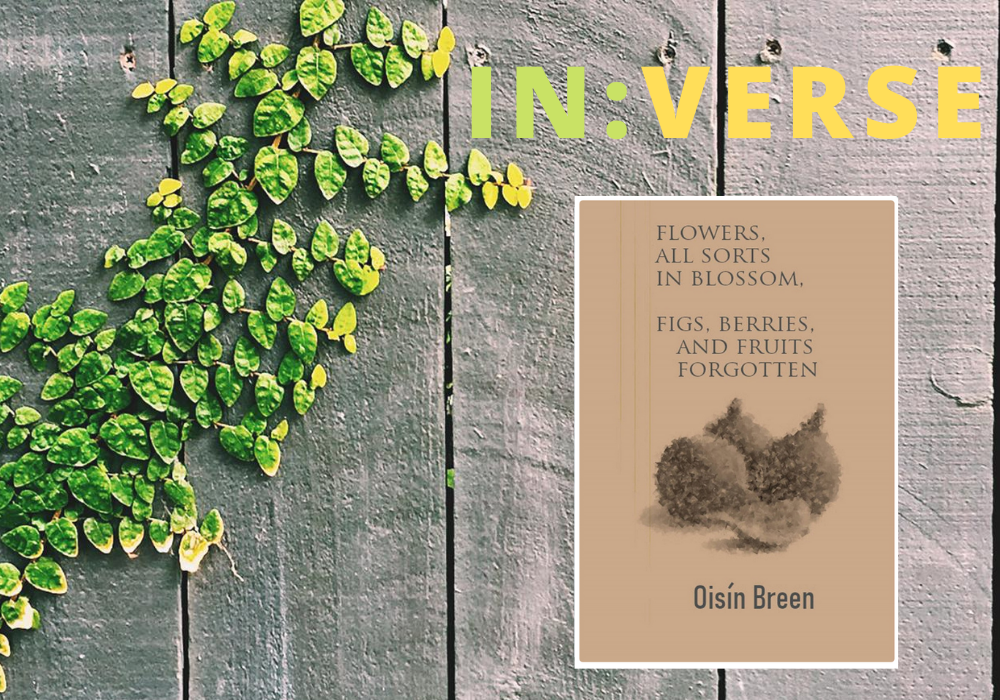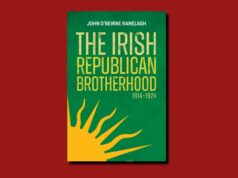
Flowers, all sorts in blossom,/figs, berries and fruits forgotten.
by Oisín Breen Hybrid (Edinburgh) | 93pp | €10.99 pb | 9781873412046
review by Fred Johnston
This is Dublin-born Edinburgh resident Oisín Breen’s début collection, published from Edinburgh’s Hybrid. A slice of it previously appeared in The Blue Nib. The collection comes with a CD of Breen reading the work. The jacket blurb states that these poems ‘represent a selection from three years of work, centred on the relationship between meaning and identity; pleasure and vice; and who really left the wine stains on the rug’. Quite. ‘He also staunchly rejects the idea that everything is art.’ There should be courses in blurb-writing, for often what’s written on a jacket can arouse interest or, as equally, disdain. A scribe must take care. Similarly, Edinburgh writer Pippa Goldschmidt suggests that the work nods to early modernism ‘and with some of the intensity of “Howl”’. Well, let’s not ignore the influence on the embryonic modernists of the romantics, either, and the list then must include Wilde, Hopkins, T.E. Hulme, Pound and Hilda (‘H.D.’) Doolittle. But, again, steady on!
There are nominally three sections to the collection and the whole corpus engages with Dublin (but not entirely), though there are other Irish poets who seem incapable of writing about anywhere else. In terms of style, it is suggested—the blurb again—that the work is intended for reading or performance, the former signalling a private relationship between reader and poet and the latter its very antithesis. This reviewer has an innate suspicion of ‘performance’ poetry, mainly because he has witnessed so much of it that is simply bad. That said, it must be acknowledged that what Breen is attempting to do (and for the most part, succeeds in doing), while not utterly new stylistically, is absolutely refreshing and—at least as importantly—thought-provoking. One immediately imagines that it would have been difficult, even soul-destroying, to attempt to have such a shotgun blast of a work published by established houses in this country. So, laudate bene meritas to Hybrid for taking it on.
In a truly poetic sense, whether one enjoys poetry laid out like this, the challenge is offered and a reader is taken on a psycho-literary investigative tour of a poet’s imagination, quite a few elements of which are exciting as well as informative. There are novelesque touches that stray from what one might expect of poetry:
Now, I press a childhood friend to the rock and threaten him until he relents – the future would not be damned, and I was right – and we drink vermouth on benches, waiting for our sorrow to mean something, as it surely must and did when we aged.
Self-indulgent? Perhaps, but what poet isn’t, given the chance? It smacks of Kerouac and of Brautigan. Later, Breen suggests that Dublin is ‘a city not divided but severed, tribal, and obsessed with her own memory’. A component of that memory in literary terms has been a determination to make romantic a sad destructive penchant among literary figures to dissolve themselves in drink. Nowadays, of course, poets have cleaned themselves up, though can be no less Machiavellian than the ‘smoke-and-daggers’ era of ‘literary’ pubs. But the myth needs refurbishing. Breen can hop from retailing the remnants of the myth to philosophising about his own ‘place’ in the world, echoing that old romantic, Whitman:
KNOW THEN, THIS IS HOW ALL LIFE BEGINS
From vital song to verse, from chorus to hearse,
From the nodding head of coming dread, to linearity and vice.
AND KNOW THAT I, A CONSTITUENT OF MYSELF,
AM MAPPED (XY), IN LINEAR TIME
Aren’t we all, one might say. But here the traveller, the philosopher, seems to be crying out to assert his I-ness, his individual absoluteness in the muddle of all that has been experienced before; poetry and song can do so much, but the ‘I’ is not forgettable. The poet is the creator of this world, for good or ill, the alpha and the omega. Though never less than interesting, there are fidgety obscurities here and there that, perhaps, an editor may have helped expand upon.
At the end of the day—or at the end of any explanation of one’s existing—the poet, being one of us after all, is striving for connection, and it is a hazard of this striving that he might as easily hook an old bicycle as a fat trout. That said, this reviewer at least was often entranced by the sheer vigour and honest gutsiness of Breen’s peregrinations, his moulding of language, even his messing about with language to explain personal relationships as well as relationships of place.
Put simply, there is much soul-searching—Gewissensprüfung—going on here throughout, and one feels that the exotic places and the familiar, the exclamations and declarations are, after all, mere symbols of the poet’s journey, indicators, if one wishes, on the laid-open map of himself. A fascinating act of cartography.
FRED JOHNSTON











